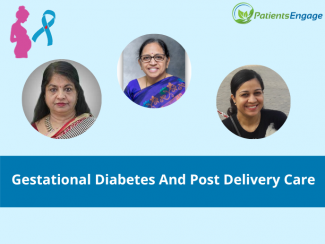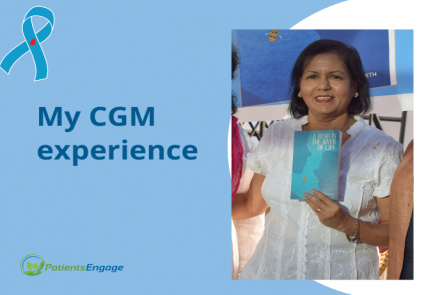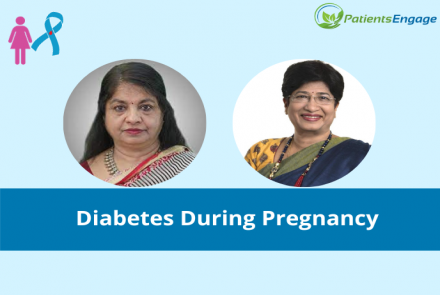
Dr. Tarakeswari S. (MD ObGyn, Senior Consultant & Head – Obstetric Medicine Unit at Fernandez Hospital), Dr. Usha Sriram (Endocrinologist, Founder of Diwas NGO) & Dr. Shital Patel (Lactation Counselor and Medical Advisor at PatientsEngage) help us understand Gestational diabetes and post-partum or post-delivery care for better management of consequences.
As we all know Gestational diabetes or Diabetes during pregnancy needs to be diagnosed on time and careful monitoring is required for better well-being of mother and baby. Gestational diabetes and its management during pregnancy is discussed earlier in a webinar organized by PatientsEngage.
Gestational diabetes impacts mother and baby during pregnancy and later in their life too. Babies can develop diabetes, obesity and neural development issues in childhood or their teens. Mother has the risk of having type two diabetes, heart disease, or non-alcoholic fatty liver.
It is the most common medical condition during pregnancy. In India, it is 10% to 15% of all pregnancies whereas Globally it is between 5% to 10%. 20 million women have gestational diabetes in the world every year and in India alone it is 3 to 5 million every year.
1. What is the normal blood sugar level post-delivery? how is it different for women who've been diagnosed with gestational diabetes?
Blood sugars of gestational diabetic mothers come back to normal after delivery and they don’t require medications. They are put on a normal diet. An oral glucose tolerance test is done between 4 to 12 weeks post-delivery to check blood sugar for monitoring. There is a 10-fold increase of developing diabetes in later life for mothers and it is in linear proportion to age. Hence, once a year checkup is recommended.
2. What happens to the blood sugar levels in case of undiagnosed diabetes?
They don’t come back to normal post-delivery and they require medication. Insulin or drug dosage has to be adjusted and diet modification is required.
3. Do blood sugar levels always come down to normal after delivery?
In most of the cases, blood sugar level comes down to normal whereas some women who have undiagnosed diabetes may require medication. Approximately 20% of women may experience abnormal blood sugar levels after delivery.
4. What precautions need to be taken for a second pregnancy after having GDM in an earlier pregnancy?
Regular monitoring and follow-up of weight gain and blood sugar are important in these cases. But in many cases regular communication with the mother is difficult. It is suggested that the health care system should follow good social support to monitor weight gain and blood sugars of mother during the inter pregnancy period.
5. Community health system’s role in GDM Management
There is a need of a bridge between maternal care of mother after 42 days of delivery. Immunization of baby and maternal health can be linked with the help of nurses. Public health midwives can be a bridge between doctor and patient. Therefore, empowering them through training and expansion of the midwifery programme is highly recommended.
6. How to counsel a mother about the concerns of GDM?
Risk factors and consequences should be communicated to the mother which include hypertension, preterm birth, macrosomia, obesity, and prolonged labor. Doctors should aware mothers about importance of maintaining a healthy BMI, weight management, regular screening of blood sugar and medical nutrition therapy. Teleconference or phone can be used for regular communication with mothers to address their concerns like effect of family history of diabetes to them and to the baby, increased risk of urinary tract infections, BMI or any other misconceptions in their mind.
7. What are the medium and long-term consequences for the mother?
There is a strong link between Gestational diabetes and Postpartum depression after delivery. Hence, awareness and support is required to deal with postpartum depression. Discussion about preconception and contraception before the next pregnancy is also very important. Regular follow-up of blood sugar for pre diabetic or diabetic mother is necessary. Heart disease, stroke, fractures, kidney problems, non-alcoholic fatty liver, eye problems or depression can be long term consequences for the mother after delivery. Hence, regular monitoring of blood sugar and a healthy lifestyle is recommended.
8. Post-delivery nutritional guidelines to women
Postpartum nutrition and exercise is an inevitable part of post-delivery nutritional guidelines. As excessive weight gain after pregnancy can lead to diabetes, women are advised to be mindful of complex carbs and fats in their diet. Physical activities like walking or swimming and allocation of time for self-care are also recommended without compromising breastfeeding.
9. Does Gestational diabetes affect lactation?
Diabetes causes reduced insulin sensitivity and is known to affect the production of milk in mothers. This can delay the onset of lactation. This is even more prominent if the new mom is on insulin, is obese or has had a complicated delivery.
However, this should not deter a new mom from breastfeeding. Research has found that breastfeeding increases insulin sensitivity and improves glucose metabolism in the mother. Studies have shown that breastfeeding for three or more months will improve postpartum glycemic control and lower HbA1c levels.
10. Does blood sugar pass on to the baby via breast milk?
Yes, glucose does pass through the mother’s milk to the baby, hence controlling mother’s blood sugar levels is essential.
11. Are there any Breastfeeding restrictions?
There is no reason why you can't breastfeed your baby if you have gestational diabetes.
Some women may find that their blood sugars drop between 54 and 90 mg/dL during a breastfeeding session. In order to avoid hypoglycemia, it’s recommended to keep your glucose levels somewhere between 90 and 180 mg/dL while breastfeeding.
Breastfeeding tips for mothers with diabetes
- Breastfeed within an hour or two after delivery.
- nurse on demand.
- Get lots of skin-to-skin contact with your baby and
- Stay relaxed, be patient and allow your hormones to kick in.
- Snack before or during nursing. Keep something nearby to raise your blood sugar quickly if needed.
- Drink lots of water to stay hydrated.
- Check your blood sugar levels each time before and after nursing. Beware of night time dips!
12. Are there any restrictions on medication during breastfeeding?
Several studies are still going on to check if certain medications can prevent diabetes in breastfeeding mothers. Insulin and Metformin medications are generally allowed due to their minimal transfer to breast milk. Short acting sulfonylureas can be allowed to reduce blood sugar levels. Whereas, newer agents like DPP4 and SGLT2 inhibitors are not allowed as their effect is not known.
13. Does diabetes contribute to babies becoming large?
Uncontrolled blood sugar can affect fetal growth resulting in larger babies and polyhydramnios (excess amniotic fluid) like condition can develop. These babies can have low blood sugar or imbalance in minerals – calcium and magnesium after birth. However, controlled diabetes has not much effect on baby.
14. Some myths on lactation
Myth: Breastfeeding transfers diabetes to the baby?
Fact: This is not true, infact mother’s milk promotes better health and protects the baby against future chronic diseases.
Myth: Eating sugar will lead to GD
Fact: GD is an autoimmune disease, so it is not directly linked to the sugar intake. However, eating excessive sugar will cause weight gain which increases risk of diabetes.
Myth: Is it safe to use insulin during breastfeeding.
Fact: Insulin is safe to use while breastfeeding. In fact, insulin molecules are considered too big to pass via the mother’s blood to the milk.
Myth: Diabetes is the reason behind the excessive growth of the baby
Fact: If your blood sugar level is higher than the standard range, it can cause your baby to grow too large. Large babies above 9 pounds can have a difficult delivery and may need a C-section.
Myth: Those women with gestational diabetes will only have a cesarean delivery
Fact: Women with gestational diabetes can have a healthy pregnancy, and normal vaginal delivery. In some complicated cases, a cesarean section may be required and the doctor will plan it accordingly.
Myth: Gestational diabetes is permanent and irreversible
Fact: Getting detected with diabetes during pregnancy can be promptly managed by an expert and it is reversible. Do not get scared at all. It is temporary and will go away after pregnancy as the blood sugar levels go back to normal after childbirth.
15. How to manage post-partum depression?
Perinatal mental health is extremely important, not only for a diabetic mother but for any mother after delivery and it is difficult to identify many times that a mother is having post-partum depression. The Edinburgh scale is used to identify change before psychologist counselling. Sudden fear of lactation or breastfeeding is mostly seen in mothers at the ninth month of pregnancy. For that lactation counsellors, nurses or midwives can be helpful for a better lactation support system. Issues like C-section due to diabetes or large baby, milk or latching issues have to be addressed as they can contribute to depression in mothers. It was found that 20% to 30% of the mothers need psychological help irrespective of the diabetes. Post-partum anxiety is also prevalent these days as mothers are anxious about what to eat, what not to eat, when to breastfeed, how to breastfeed etc. which affects lactation. Perinatal mental health support plays a vital role during the breastfeeding period for mother and baby.
16. Importance of father’s involvement in maternal care
Involvement of spouses and family members is indeed important from the antenatal period as decision makers. Involving mother and mother in law in a discussion can eliminate cultural barriers and they can be confident about the birth process. A study states that partners of women with gestational diabetes can develop diabetes themselves due to stress and anxiety. Hence, long-term health benefits can be attained due to spouses’ involvement in maternal care.
17. Are antidepressants/ mental health medications safe for baby during breastfeeding?
Keeping a check on a mother’s mental health is very important. She can be advised to take medicines after breastfeeding. Prescribing drugs that are safe during pregnancy will be a better option.
Final words:
Dr. Tara - Women should be empowered to say, “Yes, I have diabetes and I am getting treated for these problems.” We need to educate girls that getting diabetes is not a sin, we need to face it and it is treatable. It is an important public health issue irrespective of caste, religion and education that diabetes should not be stigmatized. It is just a condition to be treated.
Dr. Usha – Diabetes is just a word, not a sentence! Public education is very important to eliminate the shame of having diabetes. It is an opportunity for a mother to adopt a healthy lifestyle to prevent diabetes, heart disease and cancer. By practicing self-care, meditation, yoga, healthy eating habits or staying active can improve health.
Dr. Shital – It is a temporary and reversible condition if you take care of your blood sugar levels, so don’t panic! Breastfeeding a baby immediately after delivery and at least for six months can lower the chance of having type 2 diabetes for the mother and baby. Early detection and proper management is a key for better motherhood. A happy mother leads to a happy baby.
Conclusion by moderator – Gestational diabetes needs active management as it impacts not only the mother’s health but the health of future generations too. Be aware, educated and serious about the condition as it will not resolve on its own, it has to be managed very well.
Final words
How long you breastfeed also affects your chance of developing type 2 diabetes. In one study, breastfeeding for longer than two months lowered the risk by almost half. Breastfeeding beyond five months lowered it even more.
If you have been diagnosed with GD, do not panic! This is a temporary condition if you take care of your blood sugar levels. Breastfeed your baby soon after delivery and for long as possible or a minimum of 6 months. The longer you feed, the lower are your chances of getting type 2 diabetes.
Breastfeeding may cause changes in your blood sugar levels, so monitor it closely.
Get the right support for help and enjoy this phase of your life with your newborn.















